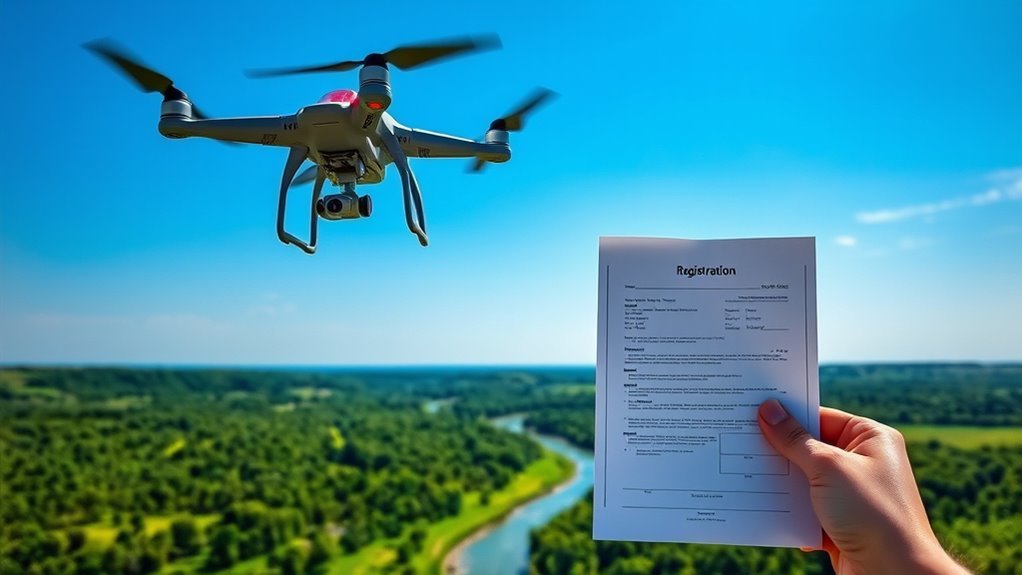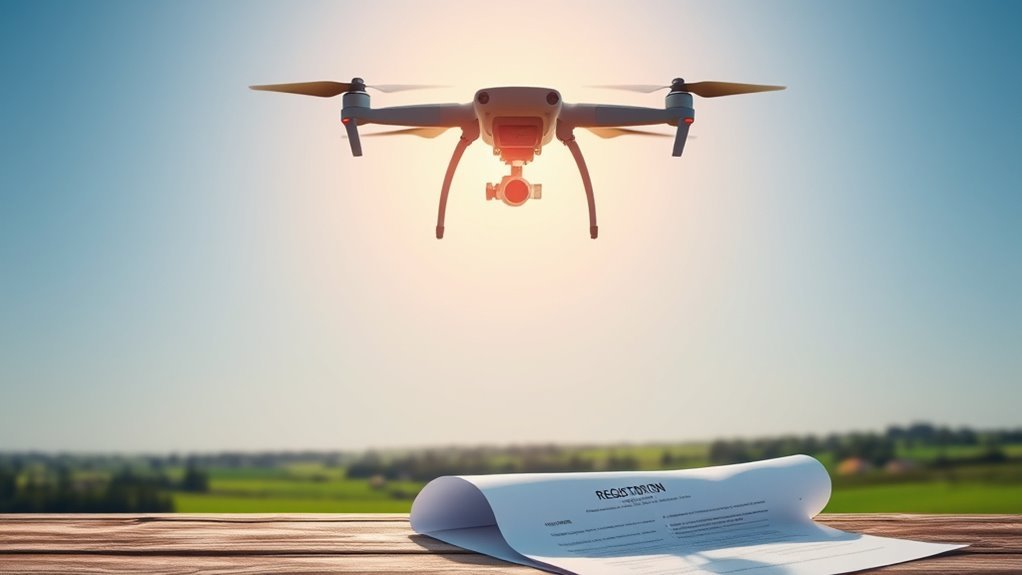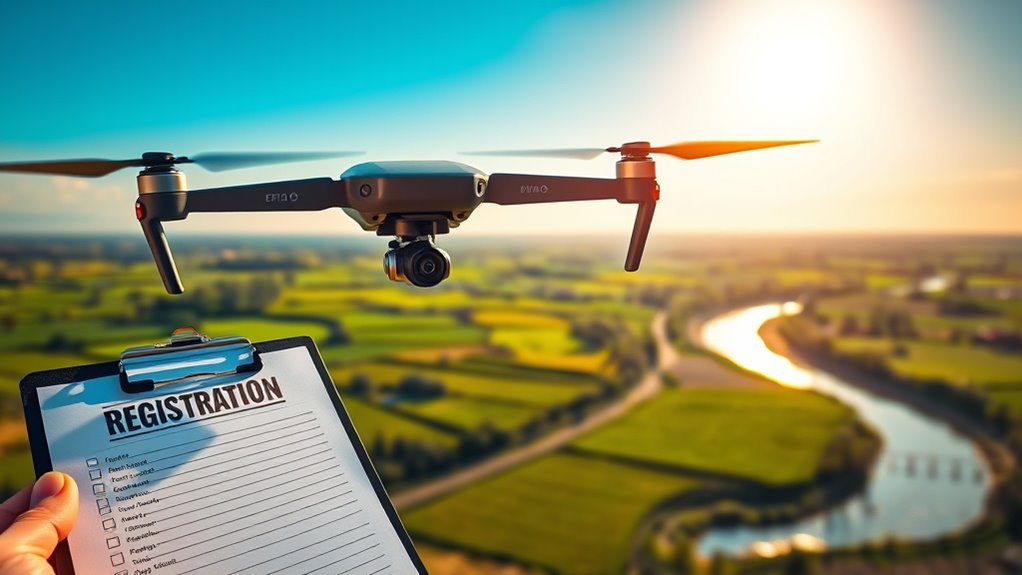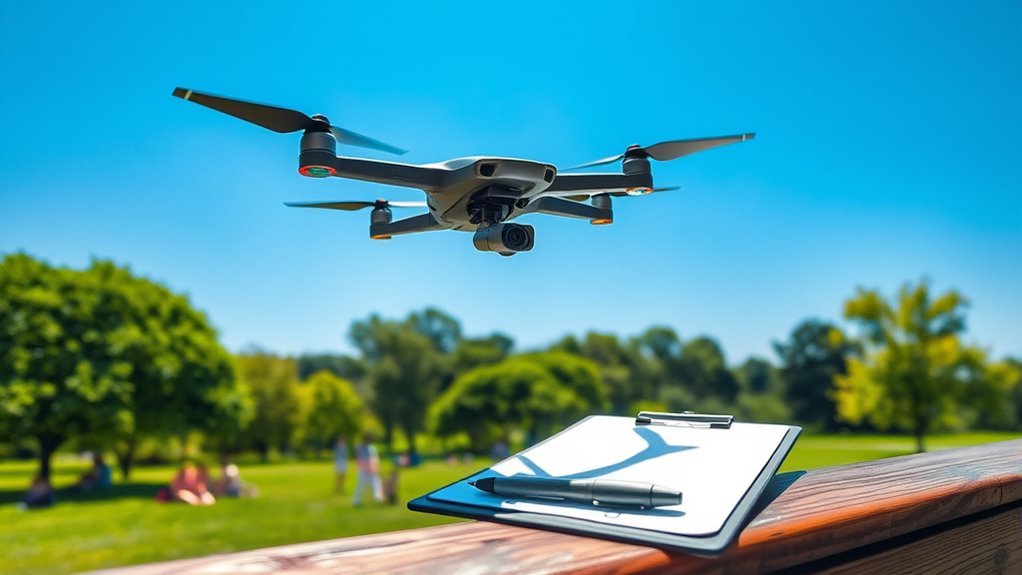If your drone weighs over 0.55 pounds, you need to register it with the FAA. This requirement guarantees safety and compliance with regulations. Drones under this weight generally don’t require registration, but it’s essential to check specific guidelines based on your drone’s use. Registering helps avoid penalties and fosters responsible flying. Staying informed about your drone’s requirements is critical for a safe flying experience, and there’s much more to explore on this topic.
Understanding Drone Registration Requirements

Have you ever wondered if your drone needs to be registered? Understanding drone registration requirements is essential for ensuring drone safety and complying with regulations. If your drone weighs over 0.55 pounds, it’s likely that registration is required. This process not only legitimizes your flying but also promotes responsible pilot education, helping you grasp the rules governing airspace. By registering your drone, you’re contributing to a safer flying environment and reducing risks associated with unregulated use. Additionally, awareness of legal regulations helps you navigate the complexities of drone operation. Plus, it empowers you as a pilot, giving you the freedom to explore the skies without fear of penalties. Furthermore, registration is necessary for commercial drones used for business purposes, ensuring compliance with specific regulations. So, take the time to familiarize yourself with these requirements, ensuring your adventures are both thrilling and compliant. Your freedom in the air starts with understanding the rules.
Types of Drones and Their Registration Needs

When it comes to drone registration, understanding the type of drone you own is essential. Different weight classes have specific registration requirements, and the distinction between commercial and recreational use can also influence your obligations. Furthermore, it is important to recognize that federal government controls navigable airspace above your property, which may impact how you operate your drone. Plus, if you’re flying internationally, you’ll need to be aware of varying regulations that could affect your drone’s registration status. Additionally, compliance with registration requirements is crucial to avoid penalties while operating your drone.
Weight Class Requirements
Understanding the weight class of your drone is essential for determining whether it needs to be registered with the FAA. Drones fall into various classifications based on their weight thresholds. Here’s what you need to know:
- Under 0.55 lbs: No registration required; fly freely!
- 0.55 to 55 lbs: Must be registered; comply with FAA regulations.
- Over 55 lbs: Additional requirements apply; plan accordingly.
- Custom-built drones: Always check weight; registration may differ.
Commercial vs. Recreational
Are you aware that the purpose of your drone can greatly influence its registration requirements? If you’re using your drone for commercial purposes, like aerial photography or surveying, you’ll need to secure commercial licensing. This mandates adherence to stricter regulations, ensuring safety and accountability in the airspace. On the other hand, if you’re flying for fun, you’re likely subject to recreational guidelines, which are less stringent but still vital for responsible flying. Understanding these distinctions is essential; it allows you to navigate the skies freely while remaining compliant with the law. So, before you take off, assess your drone’s purpose to determine the correct pathway for registration, ensuring your flying experience is both enjoyable and legal.
International Registration Variations
The registration requirements for drones vary considerably across the globe, influenced by the type of drone and its intended use. Managing international regulations can be tricky, and you might face several registration challenges depending on where you fly. Here are some key variations you should know:
- Commercial Drones: Often require strict registration and licensing in many countries.
- Recreational Drones: Some nations have minimal requirements, while others necessitate registration.
- Weight Classes: Heavier drones usually demand more stringent regulations and registration.
- Geographic Restrictions: Certain areas might have unique rules, impacting your drone’s registration needs.
Understanding these differences is essential for maintaining your freedom to fly while ensuring compliance with local laws.
When Registration Is Necessary

When it comes to drone registration, understanding weight and size requirements is vital. If your drone exceeds 0.55 pounds, you’ll need to register it, regardless of its intended use. Additionally, the purpose of your flight—whether recreational or commercial—also plays a significant role in determining your registration obligations.
Weight and Size Requirements
While you might be enthusiastic to take your drone for a spin, understanding the weight and size requirements for registration is essential to guarantee compliance with regulations. Familiarizing yourself with these drone specifications can spare you from potential registration implications. Here’s what you need to know:
- Drones weighing over 0.55 pounds (250 grams) must be registered.
- The maximum weight limit for registration is 55 pounds (25 kilograms).
- Drones under 0.55 pounds may not require registration, but check local laws.
- Size matters too; drones with a wingspan over 6.5 feet may have additional regulations.
Purpose of Use
Understanding the weight and size requirements is only part of the equation; knowing the purpose of your drone use is equally important for registration. If you’re using your drone for commercial applications, like aerial photography, registration is mandatory. The FAA requires registered drones for any operation that generates income or serves a business purpose. Even if you’re capturing stunning landscapes for personal enjoyment, flying in certain areas can still necessitate registration. It’s all about safety and accountability. So, whether you’re a budding photographer or a professional, guarantee you understand the nuances of your drone applications. Registering your drone not only keeps you compliant but also grants you the freedom to explore the skies responsibly.
The Registration Process Explained
If you’re considering flying your drone, grasping the registration process is essential to guarantee compliance with regulations. Registering your drone may seem intimidating, but it’s straightforward if you follow these steps:
- Visit the FAA Website: Start by heading to the official FAA registration portal.
- Provide Your Information: Fill in your personal details, including your name, address, and email.
- Pay the Fees: Be prepared to pay a small registration fee to complete the process.
- Receive Your Registration Number: Once registered, you’ll get a unique number to affix to your drone. Additionally, registration ensures compliance with legal requirements, protecting operators from potential legal repercussions.
Consequences of Flying an Unregistered Drone
Flying an unregistered drone can lead to serious consequences that you might not anticipate. The risks extend beyond just fines; they encompass legal penalties, safety concerns, and negative public perception. Failing to register can also trigger enforcement actions, putting your flying freedom at risk. Here’s a breakdown of the potential consequences:
| Consequence | Description |
|---|---|
| Legal Penalties | Fines or charges for violating regulations |
| Safety Concerns | Increased risk of accidents |
| Enforcement Actions | Confiscation of your drone |
| Insurance Implications | Difficulty in obtaining coverage |
| Aerial Violations | Record of non-compliance |
Being informed can help you maintain your freedom while ensuring safety and compliance. Don’t let a lack of registration ground your passion for flying.
Exemptions and Special Cases
Are there instances where you might not need to register your drone? Yes, there are specific exemptions criteria that can apply. If you fall into one of these categories, you can enjoy the freedom of flying without the hassle of registration:
- Weight Limit: Drones weighing less than 0.55 pounds (250 grams) are generally exempt.
- Special Use: Educational or research purposes may qualify for exemptions under certain conditions.
- Government Agencies: Drones operated by government entities often have different registration requirements.
- Model Aircraft: If you’re flying a model aircraft strictly for hobby use, you might not need to register.
Understanding these exemptions can help you navigate the regulations and embrace your aerial adventures without unnecessary restrictions.
Tips for Staying Compliant With Drone Laws
While traversing the world of drone flying, it’s essential to stay informed about the laws that govern your aerial activities. To guarantee drone safety, regularly check for legal updates from the FAA and local authorities. Make a habit of reviewing flight regulations specific to your region, including no-fly zones and altitude restrictions. Always register your drone if required and keep your license current. Consider joining a local drone club or online community, where you can exchange knowledge about compliance and best practices. Equip your drone with safety features like geofencing and fail-safe systems to mitigate risks. Furthermore, understanding FAA regulations can help you navigate compliance challenges effectively. Ultimately, staying compliant isn’t just about following rules; it’s about embracing the freedom to fly responsibly. Additionally, leveraging AI-driven tools can help you predict and respond to regulatory changes in real time.
Resources for Drone Pilots
Steering through the world of drone piloting can feel overwhelming, but a wealth of resources is available to help you enhance your skills and knowledge. Embracing these tools not only boosts your confidence but also guarantees drone safety. Here are four essential resources to reflect on:
- FAA’s Drone Zone – Access official regulations, registration information, and safety guidelines. Additionally, familiarize yourself with FAA safety guidelines to ensure operational freedom and public safety.
- Drone Pilot Ground School – Online courses that offer pilot education to get you certified and prepared.
- YouTube Tutorials – Visual guides and expert tips on flying techniques and maintenance.
- Local Drone Clubs – Connect with fellow enthusiasts for hands-on experience and community support. Additionally, understanding drone regulations is crucial for safe and responsible flying in various environments.
Frequently Asked Questions
Can I Fly My Drone in National Parks Without Registration?
You can’t fly your drone in national parks without complying with national park regulations. Even if you’re registered, drone flying restrictions often apply, limiting your freedom to explore these scenic areas. Always check local rules first!
How Long Does Drone Registration Last Before Needing Renewal?
Drone registration lasts for three years, after which you’ll need to initiate the renewal process. Staying updated guarantees you can keep flying freely while adhering to regulations that protect both your drone and the skies.
Are There Fees Associated With Drone Registration?
When you soar through the skies, keep in mind that registration costs apply. However, certain exemptions can lighten your load, allowing you to navigate the airwaves without breaking the bank. It’s freedom with finesse.
What Happens if I Lose My Drone’S Registration Number?
If you lose your drone’s registration number, it can complicate identification. You may face registration consequences, such as fines or inability to fly legally. Keeping your registration details secure is essential for maintaining your freedom in the skies.
Can I Register My Drone as a Company?
When you register your drone as a company, it’s like planting roots for freedom in the skies. This opens doors to liability protection and other drone registration benefits, ensuring you soar responsibly while safeguarding your venture.

